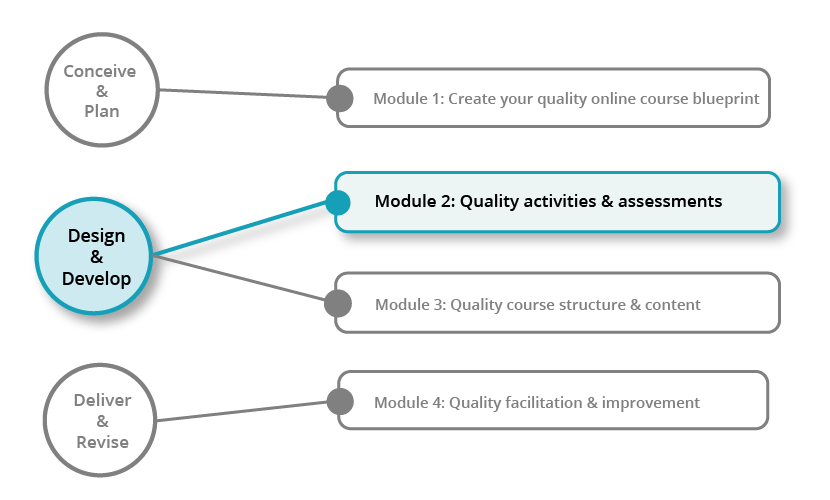11
Welcome to Module 2! This module begins at the designing and developing stage of course development. While online learning shares many of the fundamental design principles of effective activities, assessments, and interactions used in other learning contexts, it is worth considering the unique set of teaching and learning conditions that the online environment generates.
Interactions between instructors, course content, and learners in online courses are influenced by physical and social distances, familiar and unfamiliar types of teaching technologies, and cognitive, affective, and motivational challenges as well as opportunities.
As you work through this module, you will be asked to think about the following key questions:
- Do my activities and assessments help learners develop core skills and competencies that align with my course learning outcomes?
- Have I structured my activities and assessments to help to build academic integrity?
- Are my assessments authentic, reflecting discipline-specific, real-world problems and challenges?
- Do my activities and assessments follow the principles of universal design for learning?
- Do my activities and assessments help to foster learner engagement and build community in the course?

Credit: University of Waterloo | Image Description (PDF)
Module learning outcomes
By the end of the module, you should be able to
- create formative and summative assessments that align with your intended learning outcomes,
- design meaningful interactions into your course (instructor–learner and learner–learner) that foster a sense of belonging to a learning community,
- adopt strategies to encourage academic integrity, and
- effectively communicate expectations for and provide feedback on learner performance.
Key terms
The following is an alphabetical list of key terms that you might find useful to review prior to working through the content of this module:
Sections in this module
2.2 Module examples, strategies, and templates
2.3 Introduction: Creating quality interactions, activities, and assessments
2.4 Eliciting learner performance (Event 6)
2.5 Providing feedback/feedforward and assessing performance (Events 7 & 8)
2.6 Building community through activities and assessments
2.7 Summary: Creating quality interactions, activities, and assessments
2.8 Module resources for further study
Activities in this module
The module activities are designed to help you create quality activities, assessments, and interactions. For ease of use, clicking the provided links will allow you to jump directly to the location of the course where the activity is located.
- Academic-integrity checklist. Use a checklist to identify strategies to increase academic integrity (AI) in your course.
- Scaffolded assessment scheme. Use principles of backward design to create a varied, scaffolded assessment scheme aligned with learning outcomes.
- Assessment outline. Create an assessment with a clear, concise set of instructions using a template provided.
- Grading criteria. Create grading criteria for an assessment using a rubric template.

